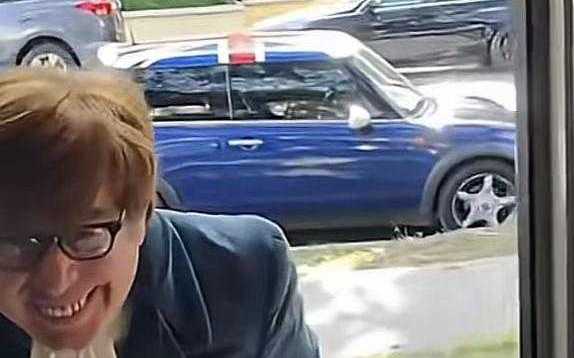Teenager creates eye-opening videos that shatter stereotypes surrounding autism and girls
"I get that a lot, that because I'm good-looking, nothing can be wrong with me — so I want to show that mental illness is diverse."

Paige Layle shares the harmful stereotypes about appearance and illness.
A 2020 study revealed that about 1 in 36 children were identified to have autism spectrum disorder (ASD), according to estimates from the CDC's Autism and Developmental Disabilities Monitoring (ADDM) Network. Of those affected, boys are four times more likely than girls to be diagnosed.
Autism Spectrum Disorder is marked by communication and social difficulties, sensory processing issues, and inflexible patterns of behavior. Almost everything that researchers have learned about the disorder is based on data derived from studies of boys.
However, researchers are starting to learn that ASD manifests differently in girls. This has led many girls to be undiagnosed or misdiagnosed.
"The model that we have for a classic autism diagnosis has really turned out to be a male model," Susan F. Epstein, PhD, a clinical neuropsychologist said to Child Mind Institute. "That's not to say that girls don't ever fit it, but girls tend to have a quieter presentation, with not necessarily as much of the repetitive and restricted behavior, or it shows up in a different way," Epstein added.
Stereotypical ASD behaviors may also get in the way of recognizing the disorder in girls.
"So where the boys are looking at train schedules, girls might have excessive interest in horses or unicorns, which is not unexpected for girls," Dr. Epstein notes. "But the level of the interest might be missed and the level of oddity can be a little more damped down. It's not quite as obvious to an untrained eye." In other words, girls with ASD usually have their symptoms go unnoticed, so they suffer in silence.
In 2020, Paige Layle, then a19-year-old eyelash technician from Ontario, Canada, shared that she has autism. However, because she's a social butterfly, most people don't realize she has the disorder. "I get that a lot, that because I'm good-looking, nothing can be wrong with me — so I want to show that mental illness is diverse," Layle told BuzzFeed.
To help people better understand how autism manifests in girls and women, Layle has made a series of videos on her TikTok page.
"I decided to start making videos because of an audio that was going all over TikTok that was making fun of autistic people. I hated it. I feel like many people don't understand how many people are autistic," she said.
Layle's videos are eye-opening because they shatter some big myths about autism and show how difficult it can be to live with the disorder, especially if you don't know you have it.
@paigelayle learn more about autism! :) i get many questions every day to make more vids about it, i will continue to show you guys! #feature #fup #fyp #featureme ♬ original sound - paigelayle
In the first video, she explains how the initial research done on autism was only on boys or men.
"Girls usually end up showing different traits than guys do. Which is why it can take us years to get diagnosed. I was 15 when I got diagnosed and that's considered early for a girl."
She also explains that girls often are diagnosed later because they are better at hiding autistic behaviors.
"This is something we call masking. Masking is basically just being like a really good actor.
It's where you take traits that everyone else is showing and start portraying them as yourself. It's like a lot of copying going on. ... In your mind you don't think you're copying. You think that this is normal and everyone feels the same way you do.
You basically feel like an alien and you're really good at hiding that. Which is why I don't seem autistic."
In part two, she discusses the idea of being high-functioning.
@paigelayle no such thing as high/ low functioning autism!!! it’s just how YOU perceive us. not about how we’re affected. #feature #featureme #fup #fyp ♬ original sound - paigelayle
"Get high-functioning and low functioning out of your vocabulary. It doesn't help anybody. I know you may think that saying 'Oh like you're high-functioning' is compliment. It's not a compliment. It's also like a reminder that I'm just masking, and it's so hard.
Masking is the most exhausting thing in the world... 'High-functioning' is basically a label that you can use to be like 'Your autism doesn't affect me that much.' But I'll tell you that everyone you think is high-functioning is greatly affected by their autism."
In part three, Paige discusses common autistic traits that girls have.
@paigelayle more on special interests later ☺️ #feature #autism #fyp #fyp #featureme ♬ original sound - paigelayle
"I am overly social. I give way too much eye contact. I'm really good in social situations. It's also very common for girls with autism to have other mental disabilities or mental disorders as well. I have seven and one of the main ones is OCD.
All of these mental illnesses stem from having autism. But OCD, anxiety, and depression are very common, especially in girls. Just the feeling that the world needs rules for you to understand it. That's why a lot of autism special interests include things like anatomy, the human body, psychology, just figuring out how the world works is our way to figure out how to live in it."
In part four, Paige further discusses the topic of masking.
@paigelayle ahhh masking. can’t live with you, can’t live without you. #feature #fup #fyp #featureme #autism ♬ original sound - paigelayle
"When you're in the autistic closet and you are not known to be autistic yet ... you like subconsciously know that you're weird and you don't know how to act or how to be.
It's like the way you walk, the way you talk, the way you wear your hair, like your mannerisms. Like everything you say. Everything you think. Everything you think that you enjoy. It's all what you are accustomed to from your peers.
I've been diagnosed for four years and I'm still trying to figure out who I am and what I actually like to do. You just get to used to creating this mask that when it's like 'Hey, you can take it off,' It's like what the frick is underneath it? I don't know what's going on."
In 2024, Layle released her first book, But Everyone Feels This Way, with Hatchett Book Group that can be accessed as a hard copy, e-book, and audiobook. She also offers neurodivergent peer consulting, merch, and more via her Linktr.ee.
This story originally appeared five years ago.
- A viral story about David Bowie giving a boy with autism his 'invisible ... ›
- A 9-year-old just perfectly broke down what living with autism is like ... ›
- A man with Autism was tired of rejected job applications, so he ... ›
- Adults are diagnosing themselves as autistic, it's valid - Upworthy ›
- 'Conventionally attractive' autistic woman reveals a big problem - Upworthy ›






 A woman is getting angry at her coworker.via
A woman is getting angry at her coworker.via  A man with tape over his mouth.via
A man with tape over his mouth.via  A husband is angry with his wife. via
A husband is angry with his wife. via 
 Austin Powers impersonator arrives at Chase Hofer's apartment.Photo Credit: Kenneth Webb, TikTok
Austin Powers impersonator arrives at Chase Hofer's apartment.Photo Credit: Kenneth Webb, TikTok
 Mom hugging crying daughter
Mom hugging crying daughter Dad kissing child on cheek
Dad kissing child on cheek Mom comforting daughter
Mom comforting daughter

 A blue light painting of an infinity symbol. Photo by
A blue light painting of an infinity symbol. Photo by